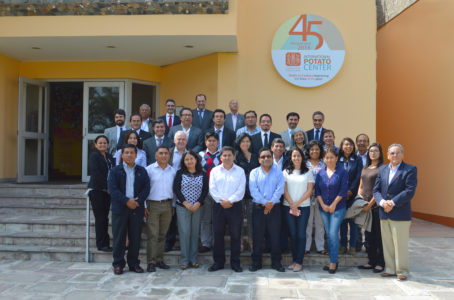More than 50 public and private sector plant scientists convened on the campus of the International Potato Center (CIP) in Lima, Peru to learn about Plant Breeders’ Rights (PBR) and the plant variety protection system under The International Union for the Protection of New Varieties of Plants (UPOV).
UPOV is and intergovernmental organization established to provide and promote an effective system of plant variety protection. The ultimate objective of UPOV is to encourage the development of new varieties of plants, for the benefit of society.

PBRs have many benefits. Since plant breeding is a lengthy and expensive process, recognizing PBR as intellectual property can give researchers protection control over the production and commercialization of the propagating material of protected varieties for a limited time period. In a commercial sense, the breeder can prepare the product for release to the market and recoup their research and development investment. Other parts of the value chain like seed multipliers can be engaged to multiply, bulk and sell the seed during this period as well. In this way, the holder of the PBR may choose to establish conditions for the use of the propagating material of the protected variety, such as the inclusion of smallholder farmers in the crop value chain.
The training event on the CIP campus was organized by the Peruvian governmental organizations Instituto Nacional Innovacion Agria (INIA), Instituto Nacional de Defensa de la Competencia y de la Protección de la Propiedad Intelectual (INDECOPI), and UPOV. Among other points of interest, participants learned how plant breeders’ rights can be used for recognizing the work of breeders and support innovation and impact of improved varieties.
In fact, PBR protection can reduce the risks involved in the research, development and commercialization of a variety. With reduced risk comes innovations which can benefit all points on the value chain.
The International Potato Center, known by its Spanish acronym CIP, was founded in 1971 as a root and tuber research-for-development institution delivering sustainable solutions to the pressing world problems of hunger, poverty, and the degradation of natural resources. CIP is truly a global center, with headquarters in Lima, Peru and offices in 20 developing countries across Asia, Africa, and Latin America. Working closely with our partners, CIP seeks to achieve food security, increased well-being, and gender equity for poor people in the developing world. CIP furthers its mission through rigorous research, innovation in science and technology, and capacity strengthening regarding root and tuber farming and food system.
